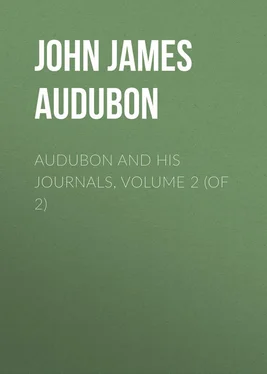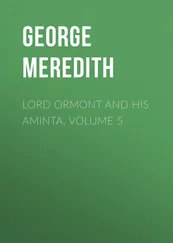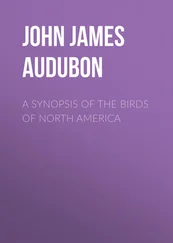John Audubon - Audubon and his Journals, Volume 2 (of 2)
Здесь есть возможность читать онлайн «John Audubon - Audubon and his Journals, Volume 2 (of 2)» — ознакомительный отрывок электронной книги совершенно бесплатно, а после прочтения отрывка купить полную версию. В некоторых случаях можно слушать аудио, скачать через торрент в формате fb2 и присутствует краткое содержание. Жанр: foreign_antique, foreign_prose, на английском языке. Описание произведения, (предисловие) а так же отзывы посетителей доступны на портале библиотеки ЛибКат.
- Название:Audubon and his Journals, Volume 2 (of 2)
- Автор:
- Жанр:
- Год:неизвестен
- ISBN:нет данных
- Рейтинг книги:5 / 5. Голосов: 1
-
Избранное:Добавить в избранное
- Отзывы:
-
Ваша оценка:
- 100
- 1
- 2
- 3
- 4
- 5
Audubon and his Journals, Volume 2 (of 2): краткое содержание, описание и аннотация
Предлагаем к чтению аннотацию, описание, краткое содержание или предисловие (зависит от того, что написал сам автор книги «Audubon and his Journals, Volume 2 (of 2)»). Если вы не нашли необходимую информацию о книге — напишите в комментариях, мы постараемся отыскать её.
Audubon and his Journals, Volume 2 (of 2) — читать онлайн ознакомительный отрывок
Ниже представлен текст книги, разбитый по страницам. Система сохранения места последней прочитанной страницы, позволяет с удобством читать онлайн бесплатно книгу «Audubon and his Journals, Volume 2 (of 2)», без необходимости каждый раз заново искать на чём Вы остановились. Поставьте закладку, и сможете в любой момент перейти на страницу, на которой закончили чтение.
Интервал:
Закладка:
Harris and Bell came back bringing several small birds, among which three or four proved to be a Blackbird 25nearly allied to the Rusty Grakle, but with evidently a much shorter and straighter bill. Its measurements will be given, of course. The weather is still lowering and cold, and it rains at intervals. We are now out of specimens of quadrupeds to draw from. Our gentlemen seem to remember the ball of last night, and I doubt not will go early to bed, as I shall.
June 21, Wednesday. Cloudy and lowering weather; however, Provost went off over the river, before daylight, and shot a Deer, of what kind we do not know; he returned about noon, very hungry. The mud was dreadful in the bottoms. Bell and young McKenzie went off after breakfast, but brought nothing but a Sharp-tailed Grouse, though McKenzie shot two Wolves. The one Harris shot last night proved to be an old female not worth keeping; her companions had seamed her jaws, for in this part of the world Wolves feed upon Wolves, and no mistake. This evening I hauled the beast under the ramparts, cut her body open, and had a stake driven quite fast through it, to hold it as a bait. Harris and Bell are this moment on the lookout for the rascals. Wolves here not only eat their own kind, but are the most mischievous animals in the country; they eat the young Buffalo calves, the young Antelopes, and the young of the Bighorn on all occasions, besides Hares of different sorts, etc. Buffaloes never scrape the snow with their feet, but with their noses, notwithstanding all that has been said to the contrary, even by Mr. Catlin. Bell brought home the hind parts, the head, and one forefoot of a new species of small Hare. 26
We are told these Hares are very plentiful, and yet this is the first specimen we have seen, and sorry am I that it amounts to no specimen at all. Harris and I walked several miles, but killed nothing; we found the nest of a Sparrow-hawk, and Harris, assisted by my shoulders, reached the nest, and drew out two eggs. Sprague went across the hills eastward, and was fortunate enough to shoot a superb specimen of the Arctic Bluebird. This evening, Mr. Culbertson having told me the Rabbits, such as Bell had brought, were plentiful on the road to the steamboat landing, Harris, Bell, and I walked there; but although we were very cautious, we saw none, and only procured a Black-headed Grosbeak, which was shot whilst singing delightfully. To-morrow morning Mr. Chardon leaves us in the keel-boat for the Blackfoot Fort, and Mr. Kipp will leave for the Crows early next week.
June 22, Thursday. We rose very late this morning, with the exception of Provost, who went out shooting quite early; but he saw nothing fit for his rifle. All was bustle after breakfast, as Mr. Chardon's boat was loading, the rigging being put in order, the men moving their effects, etc., and a number of squaws, the wives of the men, were moving to and fro for hours before the ultimate departure of the boat, which is called the "Bee." The cargo being arranged, thirty men went on board, including the commander, friend Chardon, thirteen squaws, and a number of children, all more or less half-breeds. The flag of Fort Union was hoisted, the four-pounder run out of the front gate, and by eleven o'clock all was ready. The keel-boat had a brass swivel on her bows, and fired first, then off went the larger gun, and many an Antelope and Deer were doubtless frightened at the report that echoed through the hills far and near. We bid adieu to our good friend Chardon; and his numerous and willing crew, taking the cordelle to their shoulders, moved the boat against a strong current in good style. Harris and Bell had gone shooting and returned with several birds, among which was a female Red-patched Woodpecker, 27and a Lazuli Finch. Dinner over, I went off with young McKenzie after Hares; found none, but started a Grizzly Bear from her lair. Owen McKenzie followed the Bear and I continued after Hares; he saw no more of Bruin, and I not a Hare, and we both returned to the fort after a tramp of three hours. As I was walking over the prairie, I found an Indian's skull (an Assiniboin) and put it in my game pouch. Provost made a whistle to imitate the noise made by the fawns at this season, which is used to great advantage to decoy the female Deer; shortly afterward Mr. Bonaventure returned, and a cart was sent off at once to bring in a doe which he had killed below. This species of Deer is much larger than the one we have in Virginia, but perhaps no more so than those in Maine; and as yet we cannot tell whether it may, or may not, prove a distinct species. We took all its measurements, and Bell and Provost are now skinning it. Its gross weight is 140 lbs., which I think is heavier than any doe I have seen before. The animal is very poor and evidently has fawns in the woods. The little new Lark that I have named after Sprague has almost all the habits of the Skylark of Europe. Whilst looking anxiously after it, on the ground where we supposed it to be singing, we discovered it was high over our heads, and that sometimes it went too high for us to see it at all. We have not yet been able to discover its nest. Bell is of opinion that the Red-collared Ground Finch 28has its nest in the deserted holes of the Ground Squirrel, and we intend to investigate this. He also believes that Say's Flycatcher builds in rocky caverns or fissures, as he found the nest of a bird in some such place, after having wounded one of this species, which retired into the fissures of the rock, which he examined in pursuit of the wounded bird. The nest had no eggs; we are going to pay it a visit. Bell was busy most of the day skinning birds, and Sprague drew a beautiful plant. I found a number of wild roses in bloom, quite sweet-scented, though single, and of a very pale rose-color.
June 23, Friday. We have had a fine, warm day. The hunters of Buffaloes started before daylight, and Squires accompanied them; they are not expected back till sometime to-morrow. Provost went across the river with them, and with the assistance of his bleating whistle, brought several does round him, and a good many Wolves. He killed two does, drew them to a tree, and hung his coat near them while he returned for help to bring them to the fort. The hunters have a belief that a garment hung near game freshly killed will keep the Wolves at bay for a time; but there are exceptions to all rules, as when he returned with the cart, a dozen hungry rascals of Wolves had completely devoured one doe and all but one ham of the other; this he brought to the fort. The does at this season, on hearing the "bleat," run to the spot, supposing, no doubt, that the Wolves have attacked their fawns, and in rushing to the rescue, run towards the hunter, who despatches them without much trouble, unless the woods are thickly overgrown with bushes and brush, when more difficulty is experienced in seeing them, although one may hear them close by; but it is a cruel, deceitful, and unsportsmanlike method, of which I can never avail myself, and which I try to discountenance. Bell was busy all day with skins, and Sprague with flowers, which he delineates finely. Mr. Kipp presented me with a complete dress of a Blackfoot warrior, ornamented with many tufts of Indian hair from scalps, and also with a saddle. After dinner, Harris, who felt poorly all morning, was better, and we went to pay a visit at the Opposition fort. We started in a wagon with an old horse called Peter, which stands fire like a stump. In going, we found we could approach the birds with comparative ease, and we had the good fortune to shoot three of the new Larks. I killed two, and Harris one. When this species starts from the ground, they fly in a succession of undulations, which renders aim at them quite difficult; after this, and in the same manner, they elevate themselves to some considerable height, as if about to sing, and presently pitch towards the ground, where they run prettily, and at times stand still and quite erect for a few minutes; we hope to discover their nests soon. Young Meadow Larks, Red-shafted Woodpeckers, and the Red-cheeked ditto, 29are abundant. We reached Fort Mortimer in due time; passed first between several sulky, half-starved looking Indians, and came to the gate, where we were received by the "bourgeois," 30a young man by the name of Collins, from Hopkinsville, Ky. We found the place in a most miserable condition, and about to be carried away by the falling in of the banks on account of the great rise of water in the Yellowstone, that has actually dammed the Missouri. The current ran directly across, and the banks gave way at such a rate that the men had been obliged already to tear up the front of the fort and remove it to the rear. To-morrow they are to remove the houses themselves, should they stand the coming night, which appeared to me somewhat dubious. We saw a large athletic man who has crossed the mountains twice to the Pacific; he is a Philadelphian, named Wallis, who had been a cook at Fort Union four years, but who had finally deserted, lived for a time with the Crows, and then joined the Opposition. These persons were very polite to us, and invited us to remain and take supper with them; but as I knew they were short of provisions, I would not impose myself upon them, and so, with thanks for their hospitality, we excused ourselves and returned to Fort Union. As we were in search of birds, we saw a small, whitish-colored Wolf trotting across the prairie, which hereabouts is very extensive and looks well, though the soil is poor. We put Peter to a trot and gained on the Wolf, which did not see us until we were about one hundred yards off; he stopped suddenly, and then went off at a canter. Harris gave the whip to Peter, and off we went, evidently gaining rapidly on the beast, when it saw an Indian in its road; taking fright, it dashed to one side, and was soon lost in a ravine. We congratulated ourselves, on reaching the fort, that we had such good fortune as to be able to sup and sleep here, instead of at Fort Mortimer. Bell had taken a walk and brought in a few birds. The prairie is covered with cacti, and Harris and I suffered by them; my feet were badly pricked by the thorns, which penetrated my boots at the junction of the soles with the upper leathers. I have to-day heard several strange stories about Grizzly Bears, all of which I must have corroborated before I fully accept them. The Otters and Musk-rats of this part of the country are smaller than in the States; the first is the worst enemy that the Beaver has.
Читать дальшеИнтервал:
Закладка:
Похожие книги на «Audubon and his Journals, Volume 2 (of 2)»
Представляем Вашему вниманию похожие книги на «Audubon and his Journals, Volume 2 (of 2)» списком для выбора. Мы отобрали схожую по названию и смыслу литературу в надежде предоставить читателям больше вариантов отыскать новые, интересные, ещё непрочитанные произведения.
Обсуждение, отзывы о книге «Audubon and his Journals, Volume 2 (of 2)» и просто собственные мнения читателей. Оставьте ваши комментарии, напишите, что Вы думаете о произведении, его смысле или главных героях. Укажите что конкретно понравилось, а что нет, и почему Вы так считаете.












